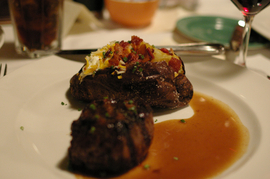Study reveals foods to eat and avoid to stave off age-related weight gain

Skip the meat and potatoes if you want to avoid weight gain, according to a new study in the New England Journal of Medicine.
Photo by Flickr user Rhett Sutphin
A recent study from researchers at Harvard University reveals that certain foods are more likely to lead to weight gain, and meat, potatoes and sugary beverages are at the top of that list.
Foods that are least likely to lead to weight gain include fruits, nuts, vegetables, whole grains and yogurt.
You can read the full story on the NPR site.


Comments
BhavanaJagat
Mon, Jun 27, 2011 : 3:33 p.m.
Food and Spirituality: The problem with this study and other similar studies is that of their involvement with one kind of consequence by eating or consuming food and drink. We tend to examine the issue of food in relation to weight gain or weight loss. Most people fail to achieve their goals of weight loss or sometimes weight gain by using dietary plans. Feeding activity must continue throughout life. Elderly people also must eat. Most nutritionists and other experts tell you about nutrients, calories, what you eat, and what not to eat. Mostly, they ignore the important function of food. Nutrition is just one aspect of the role of food. Man is no longer a food gatherer and he does not hunt for food. Man produces food by using technology, and uses distribution networks to deliver food to your plate. Many of these foods are also enriched. Vitamin deficiencies are uncommon. The most common nutritional disorder is that of excessive eating that results in weight gain and obesity. We try to address this problem by reducing food intake, and by increasing energy expenditure. Very often, we recognize that this approach may give some results in the short term and they eventually fail. A large number of people are now seeking surgical interventions to reduce food intake. Still, there is a role for food which cannot be ignored. Food provides a sense of psychological satisfaction which is not about simple satisfaction of hunger and caloric gain. Man gets attached to the food he eats, develops bonding with food, and draws emotional satisfaction because of this social relationship with food. Man finds happiness by consuming food. Which kind of food, and in which quantity may provide happiness? People can live happy, and healthy lives if the food they eat serves this basic function of giving happiness to its consumer. Avoiding meat, or potatoes would not let the problem go away.
Gordon
Mon, Jun 27, 2011 : 1:37 p.m.
Weight and exercise and age rolling all are favorite subjects into one debate-able topic. The secert to losing weight has been illustrated in the extreme durng WWII in prison camps. Hard work and litttle food. Not a recommendation. Since I have a love of cooking & food and are considered obese by my Doctor for my 70+ years my saving grace is mild medication controling blood pressure and cholestral. If I lose weight blood pressure medication goes away. Also our varied types of food preparation helps because there is a large amount of fruit & veggies . Given the the three subjects above what is lefts for us to do? Reduce quanity eaten and continue with a wide varity of food. Three ounces of meat once a day is probably more then we need; but a good hours worth of mild exercise is necessary too. By the way I like the food more then the exercise.
seldon
Sun, Jun 26, 2011 : 4:20 p.m.
The actual study (at least the summary version at <a href="http://www.nejm.org/doi/full/10.1056/NEJMoa1014296?query=featured_home&)" rel='nofollow'>http://www.nejm.org/doi/full/10.1056/NEJMoa1014296?query=featured_home&)</a> is pretty careful not to confuse correlation with causation. You aren't being quite so careful here, and neither are most other journalists who are writing about it.
Urban Sombrero
Sun, Jun 26, 2011 : 1:55 p.m.
No meat? No potatoes, and thus, no French Fries? I might as well just go jump off the roof.